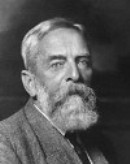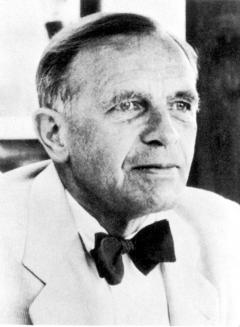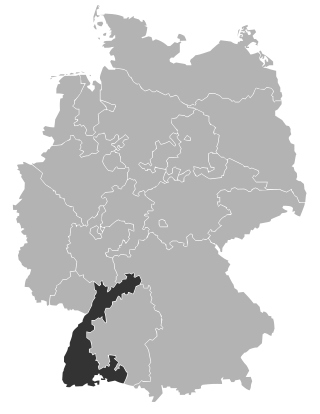Related Research Articles

Ludwig Wilhelm Erhard was a German politician and economist affiliated with the Christian Democratic Union (CDU), and chancellor of West Germany from 1963 until 1966. He is known for leading the West German postwar economic reforms and economic recovery in his role as Minister of Economic Affairs under Chancellor Konrad Adenauer from 1949 to 1963. During that period he promoted the concept of the social market economy, on which Germany's economic policy in the 21st century continues to be based. In his tenure as Chancellor, however, Erhard lacked support from Adenauer, who remained chairman of the party until 1966, and failed to win the public's confidence in his handling of a budget deficit and his direction of foreign policy. His popularity waned, and he resigned his chancellorship on 30 November 1966.

Friedrich Freiherr von Wieser was an early economist of the Austrian School of economics. Born in Vienna, the son of Privy Councillor Leopold von Wieser, a high official in the war ministry, he first trained in sociology and law. In 1872, the year he took his degree, he encountered Austrian-school founder Carl Menger's Grundsätze and switched his interest to economic theory. Wieser held posts at the universities of Vienna and Prague until succeeding Menger in Vienna in 1903, where along with his brother-in-law Eugen von Böhm-Bawerk he shaped the next generation of Austrian economists including Ludwig von Mises, Friedrich Hayek and Joseph Schumpeter in the late 1890s and early 20th century. He was the Austrian Minister of Commerce from August 30, 1917, to November 11, 1918.

The University of Freiburg, officially the Albert Ludwig University of Freiburg, is a public research university located in Freiburg im Breisgau, Baden-Württemberg, Germany. The university was founded in 1457 by the Habsburg dynasty as the second university in Austrian-Habsburg territory after the University of Vienna. Today, Freiburg is the fifth-oldest university in Germany, with a long tradition of teaching the humanities, social sciences and natural sciences and technology and enjoys a high academic reputation both nationally and internationally. The university is made up of 11 faculties and attracts students from across Germany as well as from over 120 other countries. Foreign students constitute about 18.2% of total student numbers.

Alexander Rüstow was a German sociologist and economist. In 1938 he originated the term neoliberalism at the Colloque Walter Lippmann. He was one of the fathers of the "Social Market Economy" that shaped the economy of West Germany after World War II. He is the grandnephew of Wilhelm Rüstow, the grandson of Cäsar Rüstow and the father of Dankwart Rustow.
The social market economy, also called Rhine capitalism, Rhine-Alpine capitalism, the Rhenish model, and social capitalism, is a socioeconomic model combining a free-market capitalist economic system alongside social policies and enough regulation to establish both fair competition within the market and generally a welfare state. It is sometimes classified as a regulated market economy.

Wilhelm Röpke was a German economist and social critic, best known as one of the spiritual fathers of the social market economy. A Professor of Economics, first in Jena, then in Graz, Marburg, Istanbul, and finally Geneva, Switzerland, Röpke theorised and collaborated to organise the post-World War II economic re-awakening of the war-wrecked German economy, deploying a program sometimes referred to as the sociological neoliberalism.
Ordoliberalism is the German variant of economic liberalism that emphasizes the need for government to ensure that the free market produces results close to its theoretical potential but does not advocate for a welfare state.
The Anglo-Saxon model is a regulated market-based economic model that emerged in the 1970s based on the Chicago school of economics, spearheaded in the 1980s in the United States by the economics of then President Ronald Reagan, and reinforced in the United Kingdom by then Prime Minister Margaret Thatcher. However, its origins are said to date to the 18th century in the United Kingdom and the ideas of the classical economist Adam Smith.
The National Prize of the German Democratic Republic (East Germany) (German: Nationalpreis der Deutschen Demokratischen Republik) was an award of the German Democratic Republic (GDR) given out in three different classes for scientific, artistic, and other meritorious achievement. With scientific achievements, it was often given to entire research groups rather than individual scientists.

Walter Eucken was a German economist of the Freiburg school and father of ordoliberalism. He is closely linked with the development of the concept of "social market economy".
Franz Böhm was a German politician, lawyer, and economist.
ORDO — Jahrbuch für die Ordnung von Wirtschaft und Gesellschaft is a peer-reviewed academic journal established in 1948 by German economists Walter Eucken and Franz Böhm. The journal focuses on the economic and political institutions governing modern society.
Neue Marx-Lektüre or NML is a revival and interpretation of Karl Marx's critique of political economy, which originated during the mid-1960s in both Western and Eastern Europe and opposed both Marxist–Leninist and social democratic interpretations of Marx. Neue Marx-Lektüre covers a loose group of authors primarily from German-speaking countries who reject certain historicizing and empiricist interpretations of Marx's analysis of economic forms, many of which are argued to spring from Friedrich Engels role in the early Marxist workers' movement.
The Centre for European Policy (cep) is a German think tank whose task it is to evaluate the European Union's draft laws and legislation on the basis of ordoliberal free market criteria. Established in 2006 under the umbrella of the Stiftung Ordnungspolitik foundation, the cep is based in Freiburg. It is headed by Lüder Gerken, chairman of the executive board of the Stiftung Ordnungspolitik and the Friedrich-August-von-Hayek Foundation. Members of the board of trustees include Roman Herzog, Leszek Balcerowicz, Frits Bolkestein, Udo Di Fabio, Jürgen Stark, Holger Steltzner and Hans Tietmeyer.
Stiftung Ordnungspolitik is a nonprofit organization dealing with the ordoliberal tradition of the Freiburg school of economics. It strives to maintain and further develop ordo-economics based on the ideas of Walter Eucken and Friedrich August von Hayek.

Friedrich Carl Nicolaus Constantin von Dietze was an agronomist, lawyer, economist, and theologian. He was a member of both the Confessing Church and the "Freiburg Circle" during the Nazi era.
The Freiburg Circles were a school of economic thought founded in the 1930s in Germany.
Friedrich August Lutz was a German economist who developed the expectations hypothesis.

The Protestant Church in Baden is a United Protestant member church of the Protestant Church in Germany (EKD), and member of the Conference of Churches on the Rhine, which now functions as a regional group of the Community of Protestant Churches in Europe (CPCE). The Evangelical Church in Baden is a united Protestant church. Its headquarter, the Evangelical Superior Church Council is located in Karlsruhe.
Edith Eucken-Erdsiek was a German philosopher and writer.
References
- ↑ Feasel, Kevin (July 2008). "The Freiburg school of economics" . Retrieved August 1, 2009.
- ↑ Boas, Taylor C.; Gans-Morse, Jordan (1 June 2009). "Neoliberalism: From New Liberal Philosophy to Anti-Liberal Slogan". Studies in Comparative International Development. 44 (2): 145. doi: 10.1007/s12116-009-9040-5 . ISSN 1936-6167.
- ↑ Blumenberg-Lampe, Christine (2004). "Franz Böhm." Christliche Demokraten gegen Hitler: Aus Verfolgung und Widerstand zur Union. Ed. Buchstab, Günter; Kaff, Brigitte; Kleinmann, Hans-Otto. Freiburg, Germany: Herder, 2004. 108. Print.
- ↑ "Biografie Walter Eucken (German)". Bayerische Nationalbibliothek. Retrieved 5 August 2015.